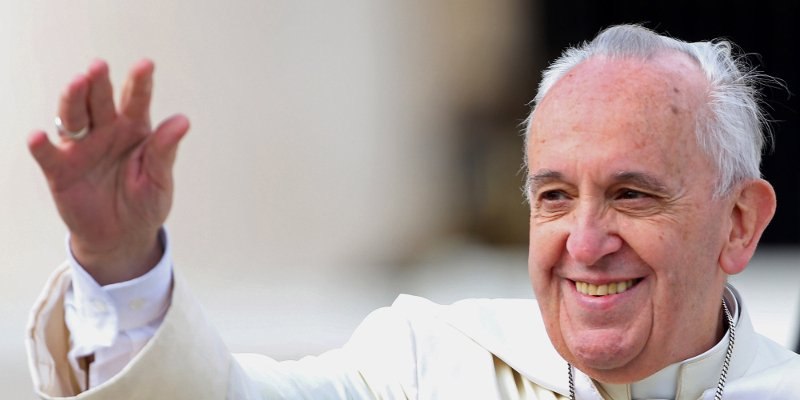Pope Francis is popular but his ability to impact American politics may be limited
The visit of Pope Francis to the United States will be one of a popular prelate, liked by Catholics and non-Catholics alike. But it’s not clear how much impact he can have on changing minds in Congress and in the public on issues like climate change, abortion and aiding immigrants and the poor. In the latest Economist/YouGov Poll, three times as many Americans have a favorable opinion of the Pope as have an unfavorable one, but unfavorable ratings are higher among Republicans and conservatives than they are among Democrats and liberals.
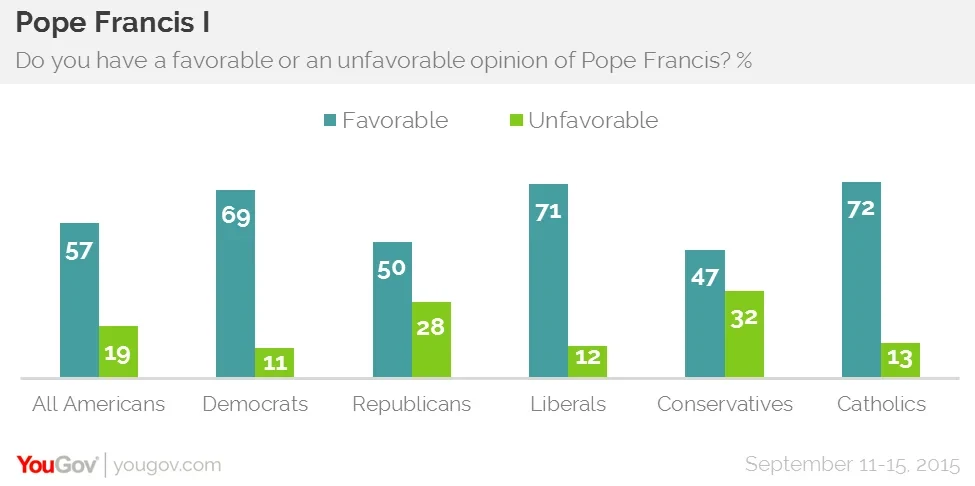
This Economist/YouGov Poll includes more respondents than a typical poll, so the size of the Catholic subgroup is large enough for internal comparisons. One very important difference is between Catholics who are observant and attend church regularly, and those who are not churchgoers. And many of those who call themselves Catholics are not observant. Of the one in five American adults who identify as Catholic, less than half (44%) say they attend religious services at least once a month. On some of the issues that Pope Francis has highlighted recently, there are differences between the observant and the non-observant, with observant Catholics more supportive of what the Pope says.
61% of Catholics who attend church regularly would favor Congressional action on climate change; 51% of non-observant Catholics would. Observant Catholics are also more in favor of legislation to increase legal immigration than non-observant Catholics are. And on the issue of abortion, a majority of observant Catholics favor Congress imposing additional restrictions, compared with only 37% of non-observant Catholics.
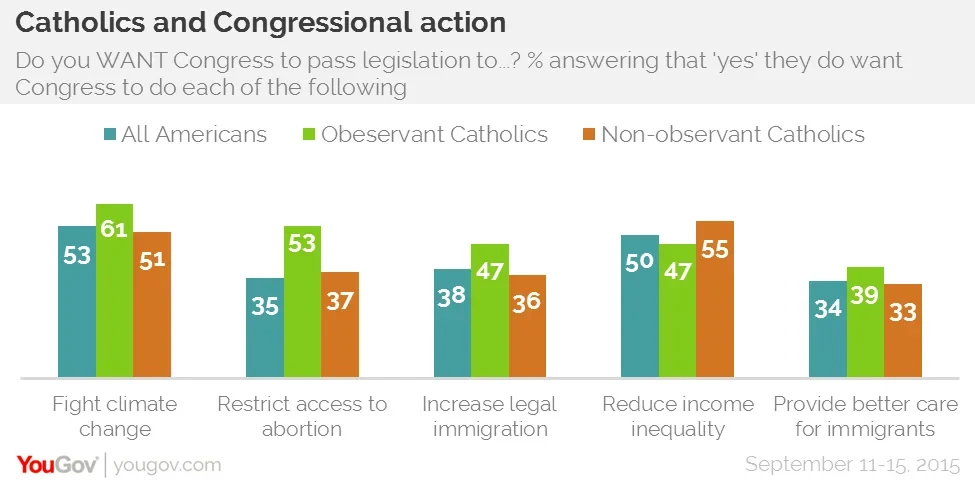
But when it comes to legislation to reduce income inequality, non-Catholics are more in favor.
Abortion is an issue where an active attachment to the Catholic Church, as measured by church attendance, has a large impact on Catholic opinion. Nearly two-thirds of churchgoing Catholics would make all or most abortions illegal. 58% of non-regular Mass attendees would keep all or most abortions legal.
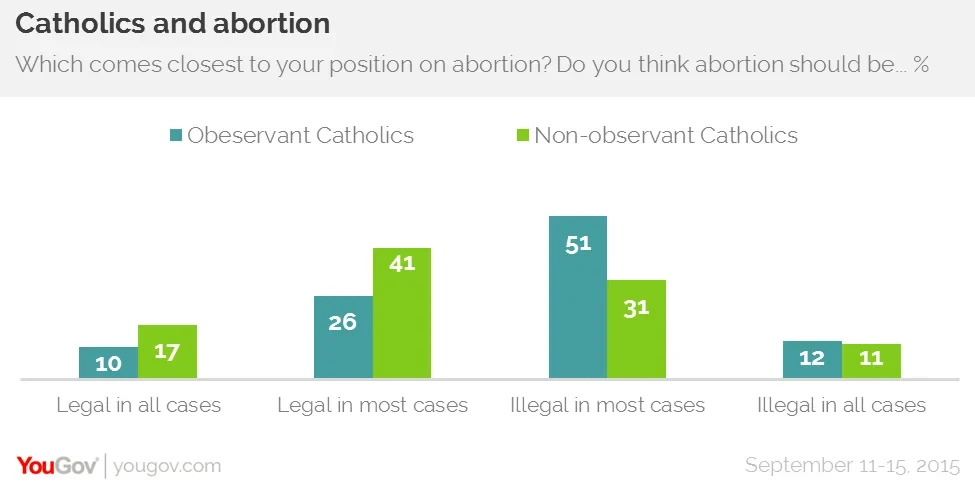
However, most churchgoing Catholics, like their non-church attending colleagues, say that abortion is not a sin when the mother’s life is at risk. Two in three Catholic churchgoers say abortion is a sin when the mother’s life is not at risk. Just 40% of non-churchgoing Catholics agree. Both groups express support for the Pope’s decision to give priests the ability to give women absolution for a previous abortion.
Hispanics make up nearly one in four churchgoing Catholics, but they are also a significant part of the non-observant group, too.
Although there is little difference between observant and non-observant Catholics when it comes to the political parties they identify with, party identification plays an important role in the attitudes of Catholics, especially on the issue of climate change. 75% of Catholic Democrats what Congress to take action on climate change. Only a third of Catholic Republicans do (51% of Catholic Republicans oppose Congressional action on climate change).
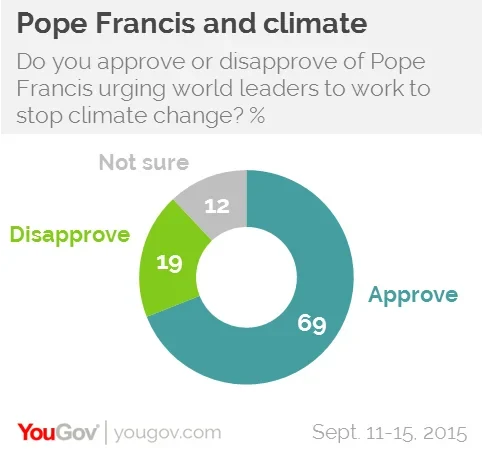
One reason the Pope may not have all that much impact on climate change legislation is that many people do not think of it as a moral issue. Less than a third of the public – as well as less than a third of Catholics – think it is. Consequently, it may not be a surprise that American Catholics do not think either Catholics or Catholic politicians need to follow the Pope on issues like the environment and climate change. Still, American Catholics they are happy Pope Francis is urging world leaders to act on the issue. More than two-thirds of Catholics approve of this effort on climate change.
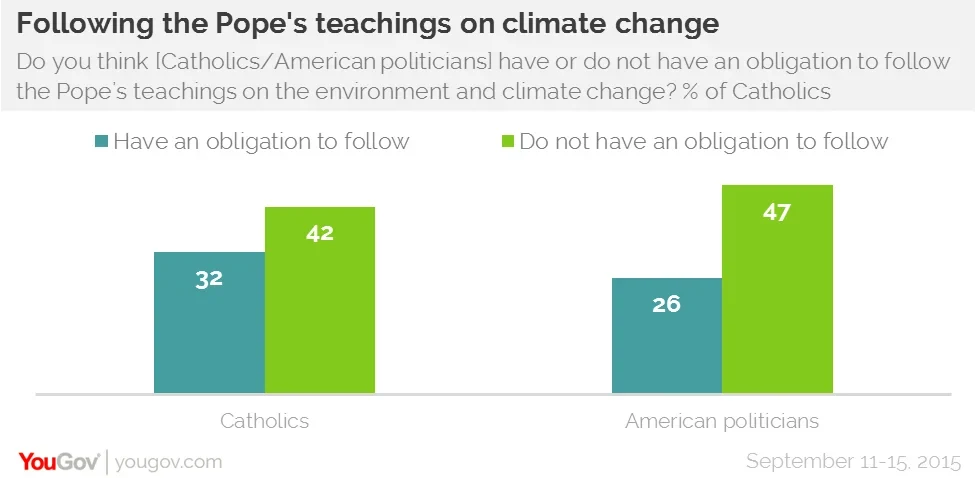
But the Pope gets general support for many of his actions, not only on climate change and his willingness to make it easier to receive absolution for abortions. Three in four Catholics approve of the Pope’s efforts to normalize relations between the U.S. and Cuba (just about as many Catholics approve of this Pope’s work on behalf of a Communist country as approve of Pope John Paul II’s efforts against Communism during that papacy). 54% of Catholics approve of the Vatican granting formal recognition to the Palestinian state (less than a majority of the public overall agrees with that).
Americans are willing to have the Pope active in world affairs, although less than one in five believe he can have a great deal of influence. Still, most American believe he should take an active part if he thinks he can help. There is less willingness to have the Pope intervene in U.S. domestic affairs.
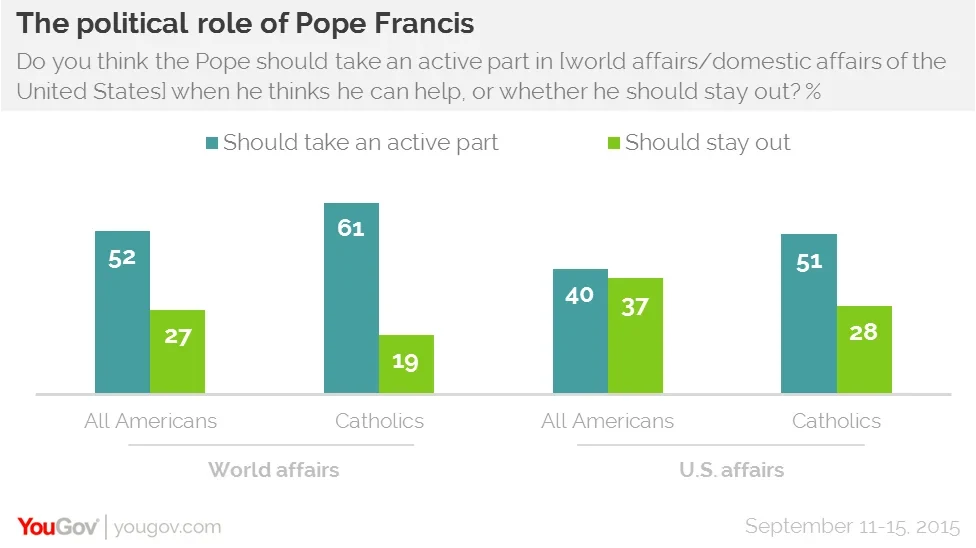
As of last weekend, many Americans weren’t especially aware of the Pope’s visit. Only 36% of Catholics had heard a lot about the upcoming visit. Only 13% had heard a lot about his upcoming address to Congress. By two to one, Americans say that invitation to the Pope was appropriate (and by more than four to one, Catholics agree).
But will the Pope be able to influence Congressional actions? Americans in this poll are skeptical Congress will take any action at all on the issues the Pope cares about – like climate change, income inequality, treatment of immigrants and abortion. And few expect his speech to make legislation on those issues any more likely.
See the Economist/YouGov results
Economist/YouGov poll archives can be found here.
